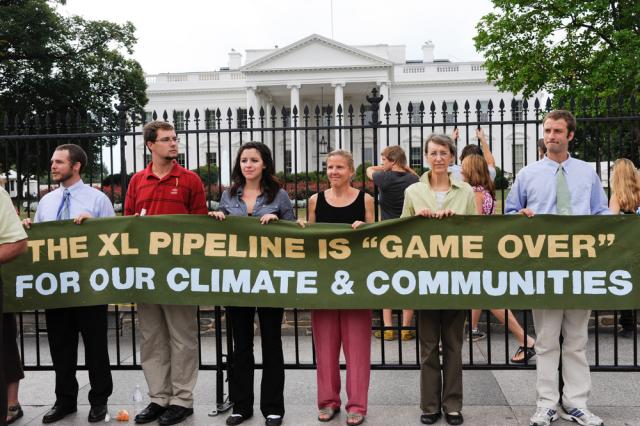Canada’s top environmental watchdog official released a damning report today acknowledging the federal government’s complete failure to account for the cumulative impacts of Alberta tar sands development. The report from Environment Commissioner Scott Vaughan also confirmed that information about Canada’s greenhouse gas emissions is so poorly collected that the country really has no idea whether it is on track to meet its pollution reduction targets – targets which Canada has repeatedly scaled back despite its legally-binding international commitment to action dating back 20 years.
According to the report, “The government has not put in place management systems and tools needed to achieve, measure and report on greenhouse gas emission reductions.”
Vaughan describes the government’s current climate action plan as “disjointed, confused, non-transparent.”
“I think it’s next to impossible that Canada is going to be able to reach its Kyoto target, that’s a given. The gap is so wide now, but I think what we’ve said as well is the basic problems that we’ve seen now, and the overall federal-wide co-ordinaton of these climate change programs really needs to get its act together. And if they don’t, then we have some doubts on whether or not they are going to be able to meet any target, Vaughan said at a news conference today.
The report also slammed Canada’s oversight of the filthy Alberta tar sands industry. By failing to collect baseline data prior to the industrialization of the area – and then adding insult to injury by failing to conduct regular monitoring of impacts from tar sands development – Canada has dropped the ball on its responsibilities to protect the health of local communities and the environment in northern Alberta and beyond.
Postmedia News reporter Tobi Cohen sums up the findings on oil sands:
[Canada’s environment commissioner] Scott Vaughan noted even the government’s own scientists don’t know what the long-term effects will be on water, fish, land, air and wildlife.“During our audit, we found that, despite repeated warnings of gaps in environmental information, little was done for almost a decade to close many of those key information gaps,” he said in his report, noting both Environment Canada and Fisheries and Oceans Canada have for years complained about the absence of vital environmental information.“As a consequence, decisions about oilsands projects have been based on incomplete, poor or non-existent environmental information that has, in turn, led to poorly informed decisions.”
Mike Hudema, Greenpeace Canada climate and energy campaigner, reacted strongly to the report’s findings in a statement:
“Faced with this kind of a damning report from the federal Environment Commissioner, the responsible reaction would be to put a hold on all tar sands projects that were approved without proper environmental assessment. Federal Environment Minister [Peter] Kent should also offer a full apology to all the communities living in the tar sands region who have been inundated with the toxic impacts of tar sands projects that were approved with ‘incomplete, poor or misleading information.’The Harper government has failed in its responsibility to protect the environment and First Nation communities. Minister Kent can’t pretend that promising to collect better data in the future somehow makes up for the fact that existing projects should have never been approved in the first place.”
The report’s conclusion states clearly:
“2.41 We have concluded that incomplete environmental baselines and environmental data monitoring systems needed to understand changing environmental conditions in northern Alberta have hindered the ability of Fisheries and Oceans Canada and Environment Canada to consider in a thorough and systematic manner the cumulative environmental effects of oil sands projects in that region.”
With these findings now confirmed by Canada’s top environment watchdog, the Obama administration also has to do some deep soul-searching about the wisdom of approving the Keystone XL pipeline.
Allegations of ethical corruption at the State Department aside, how could the Obama administration allow the Keystone XL pipeline to proceed knowing full well that there are serious environmental and public health threats posed by the Alberta tar sands?
Now that the Canadian federal Environment Commissioner has confirmed beyond a shadow of a doubt that Canada is not properly overseeing the tar sands, why would the U.S. build a pipeline enabling a rapid expansion of an already out-of-control industrial polluter operation?
Image credit: Rena Schild / Shutterstock.com
Subscribe to our newsletter
Stay up to date with DeSmog news and alerts







